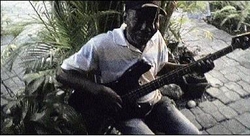'Ranchie' back onstage - Pays homage to reggae music greats
Published: Sunday | December 6, 2009

Contributed
Bertram 'Ranchie' McLean
Howard Campbell, Gleaner Writer
Back in the 1970s, nothing drove a great reggae song more than a rocking bass line. One of the people behind some of those memorable grooves was Bertram 'Ranchie' McLean, member of the legendary Revolutionaries band. The diminutive McLean, 61, made his stage comeback yesterday on the Dub Show in St Andrew. Along with drummer Leroy 'Horsemouth' Wallace, guitarist Earl 'Chinna' Smith and keyboardist Ansel Collins, he paid homage to dub masters Augustus Pablo, Osbourne 'King Tubby' Ruddock and Lee 'Scratch' Perry.
It had been some time since McLean played live. He came out of retirement last year to play bass on a recording session for roots-reggae veterans The Meditations, best known for the Channel One classic, Woman Is Like A Shadow.
"A still practise when mi ready, but mi have a different line of work now so that tek up most of mi time," McLean said during a recent interview with The Sunday Gleaner. "I had a little accident some years ago an' it kinda set mi back."
That "accident" was a stroke McLean suffered in 1998. It severely weakened the left side of his body and prevented him from playing for more than three years.
No embarassment
"Mi couldn't lift up this (a piece of paper) so mi didn't even think 'bout play a instrument 'cause mi neva waan embarrass miself," he said.
For nearly 10 years McLean was a member of the Revolutionaries, the house band at Channel One, a studio in Whitfield Town run by the Hoo Kim brothers, Jo Jo and Ernest. Collins, drummer Sly Dunbar, bass player Lloyd Parkes and percussionist Uzziah 'Sticky' Thompson were other core members of the Revolutionaries. Their stripped-down sound was complemented by various horn players including saxophonist Tommy McCook.
McLean and Dunbar were childhood friends from the Compound area of Olympic Gardens. He started out as a guitarist, playing on Hong Kong Flu by the Ethiopians at Federal Records and also did sessions at Studio One.
Along with Dunbar, Collins and Parkes, he was a member of Skin, Flesh and Bones, resident band at the Tit For Tat club along the then hip Red Hills Road strip in St Andrew. When Channel One opened in 1973, they were among the musicians approached to help get it off the ground.
Parkes would leave around 1976 to head the Professionals, house band of rival producer Joe Gibbs. McLean said it was during a recording date with singer Delroy Wilson that he inadvertently switched to bass.
"Somebody was playing the bass but dem (producers) didn't like the pattern, so mi tek it an' decide fi mek a line (makes a bassy sound) which was Have Some Mercy," McLean recalled. "From dat, dem sey 'A you wi waan play bass pon the song dem'."
McLean played bass and guitar on many hits at Channel One including Woman Is Like A Shadow, Right Time by the Mighty Diamonds, Things And Time (the Wailing Souls), Ballistic Affair (Leroy Smart), Up Park Camp (John Holt) and the rocking instrumental Death In The Arena.
He also played bass on many sessions for Sonia Pottinger, reggae's first female producer. His best known tracks for her include Marcia Griffiths' timeless rendition of Dreamland and Culture's Money Girl.
McLean toured as well, backing Peter Tosh, Burning Spear and Jimmy Cliff, with whom he stayed longest. He played on Cliff's 1982 Special album, writing the song Rub-A-Dub Partner.
poker-machine business
After recovering from the stroke, McLean left music behind, joining his old boss, Jo Jo Hoo Kim, in the poker-machine business. Currently, he services gaming boxes, mainly in Kingston.
Singer Jefferey Starr, one of his eight children, has followed his musical footsteps. He had a minor hit song two years ago with I'm Sorry.
McLean says he lives a quiet life in the Portland Cottage area of Clarendon. He listens to contemporary dancehall/reggae but is not impressed.
"What happening now is not music," he said. "A lot of it is like a man listen to a commercial an' mek a song. There's no creativity."
'The Meaning of Christmas' comes easily

Gardiner
Mel Cooke, Gleaner Writer
The Meaning of Christmas came easily to Barrington Gardiner, the acrostic song flowing "through my brain, into my hands, on the paper", as he tells The Sunday Gleaner.
So he wrote a line for each letter of the time of year when little children glow with anticipation, shopping malls overflow, parties are many and merry, and frustrated drivers honk maybe as frequently as revellers toot their horns to welcome the New Year as the season closes.
However, The Meaning of Christmas does not get into the hustle and bustle of shopping or the glee of partying. The ballad, instead, speaks to the general feeling of well-being in late December, as well as the significance of 'the season of good cheer', which lasts long after the food has been eaten and the presents become ordinary.
Barrington Gardiner wrote:
"C is for Christmas, the season of good cheer
H is for happiness, to last throughout the year
R is for respect, which each and all must show
I is for indulgence, to know how far to go"
He did not set out to write a Christmas song when The Meaning of Christmas came at the end of summer, 1960. "It was a day like any other day, but I got an inspiration. I was writing other stuff but the Christmas carol came to me," he said.
He did not have to do any rewrites and editing, as "it came to me one time, exactly as it is today."
Gardiner did not have to go very far to find someone to sing The Meaning of Christmas, his brother Boris providing the vocals, and his band, The Rhythm Aces, doing the music close to Christmas 1960 for Island Records. As Barrington described the natural flow of the song, from mind to paper, and then brother to brother, it was the same thing. "He knew exactly how to sing it".
Number-two on charts
The Meaning of Christmas soon made it on to the charts, Gardiner said it peaked at number two on the then Jamaica Broadcasting Corporation's countdown. However, he laughed as he said, "financially, it was a disaster".
Gardiner said when he was writing the song he "knew it was good, but I did not make any predictions". Now, he notes that "it has outlasted many songs I thought would have lasted", and there is even a new interpretation, with the same melody, but different meanings given to the days of Christmas.


















